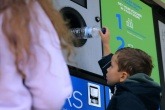Reverse vending machines tested at University of Strathclyde
Study by Keep Scotland Beautiful suggests more pilot studies are needed to determine effective incentives for RVMs in preparation for Deposit Return Scheme regulation.
 Ahead of the introduction of the Deposit Return Scheme (DRS), Keep Scotland Beautiful has trialled the use of reverse vending machines (RVMs) at the University of Strathclyde.
Ahead of the introduction of the Deposit Return Scheme (DRS), Keep Scotland Beautiful has trialled the use of reverse vending machines (RVMs) at the University of Strathclyde.
The ‘No Lectures: Sort It, Recycling It’ campaign, funded by Coca-Cola Europacific Partners, tested waste capture methodologies designed to improve both material quality and segregation at source over an eight week period.
Testing reverse vending machines
The campaign used a number of engagement strategies to improve student recycling rates, and encourage them to think about their waste disposal.
Throughout the campus, promotional materials and communication assets were placed on bus shelters, banners and bollards, providing consistent messaging throughout the trial period.
A key aspect of the initiative was the installation of two RVMs in high-footfall areas near food service facilities in November 2024. These machines collected a total of 478 recyclable items—215 aluminum cans and 263 PET bottles.
The RVM systems used automated material identification and sorting technology to separate materials into different streams, preventing cross-contamination with general waste. Donations also had a 20p per unit charitable incentive, hoping to motivate students to use the machines for social benefit rather than a direct financial reward.
Commenting on the introduction of RVMs, Amy Ritchie, Head of Sustainable Resources & Social Responsibility at the University of Strathclyde, said: “Feedback has also highlighted the need for more consistent communications around reverse vending machines to understand what they are and the benefits of their use, suggesting that initiatives like this take time to embed and drive behaviour change.”
The campaign also included a partnership with not-for-profit, Every Can Counts, who installed an art piece made out of 2,000 painted drink cans on the Strathclyde campus.
What does a deposit return scheme need to address?
Before and after the campaign, students were given questionnaires and put into focus groups to unpack how they related to the campaign messaging, with a lack of knowledge of recycling infrastructure highlighted as a key reason. 57 per cent citied that there were no separate bins just for recycling.
A further 40 per cent reported that messaging on bins was confusing, making it unclear where to recycle.
When asked what would motivate them to recycle more, 65 per cent asked for more recycling points, and half said an incentive would encourage them to recycle.
Other motivators included better knowledge of what happens when recycling leaves the area, issuing fines to those who don’t recycle, and more communication about the environmental effects of not recycling.
Discussing the results of the campaign questionnaires, Jo Padwick, Senior Sustainability Manager at Coca Cola Europacific Partners GB, said: “It’s encouraging to hear how eager students are to recycle and the efforts they make to do so, which came through in our discussions. However, there’s clearly more work to be done and these findings reveal two key factors that would make a real difference to helping them recycle on the go - more recycling points as well as rewards or incentives.”
Ahead of the introduction of DRS in the UK, Keep Scotland Beautiful recommended:
- Further trials to test different types of incentives to see which are the most effective at engaging people, improving recycling rates, and reducing contamination
- A longer lasting campaign to introduce students to new infrastructure
- Providing ample time in trials to allow for the extensive collaboration needed to introduce new waste management infrastructure, such as RVMs
Heather McLaughlin, Campaigns and Social Innovation manager at Keep Scotland Beautiful, added: “The upcoming introduction of a Deposit Return Scheme will increase recycling rates and be a landmark step towards a litter free Scotland and it’s imperative that we get our messaging right ahead of its arrival.”








